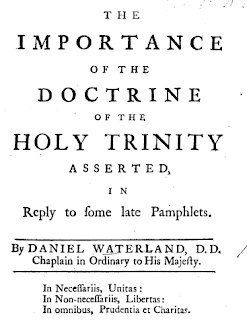"The right faith in the Trinity is short and plain": Waterland on the clarity of the doctrine of the Trinity
It is horrible misrepresentation of the Case, to pretend as if we taught, that "the eternal Interest of every Plowman or Mechanick hangs on his adjusting the Sense of the Terms, Nature, Person, Essence, Substance, Subsistence, Coequality, Coessentiality, and the like". No; those are technical Terms, most of them, proper to Divines and Scholars: And not only Plowmen and Mechanicks, but very great Scholars too, lived and died in the conscientious Belief of the Doctrine of the Trinity, long before any of those Terms came in. They are of use indeed for settling the Controversy with greater Accuracy among Divines, who understand such Terms: But the Doctrine itself is clear without them, and does not want them, but stands firm and unshaken, independent of them. Any plain Man may easily conceive, that Father, Son, and Holy Ghost are properly divine, are not one the other, and yet are one God, by an intimate Union; and that the Son in particular, being God and Man, is one Christ. These prime Verities and whatsoever else is necessarily implied in them, may be conceived to be right ; and whatsoever is contrary to them, or inconsistent with them, will of consequence be wrong. This is enough for any plain Christian to know or believe; and he is not ordinarily obliged to be more minute in his Inquiries, or to understand scholastick Terms. It is not to be expected that common Christians should be expert Disputants in Controversies of Faith, any more than that they should be profound Casuists in relation to Practice: Yet Christian Practice is necessary to Salvation, and so is Christian Faith too; and the Obligation to obey a general Precept, or to believe a general Truth, is not superseded, or evacuated by a Man's being unacquainted with Terms of Art, or by his being liable to mistake in some remote, or minute Circumstances belonging to the Doctrine itself ...
[Waterland then discusses the Golden Rule of Matthew 7:12, noting that the common Christian does not require knowledge of the discussions of divines and causists but may be "safely trusted" with the "naked rule".]
The same Thing is true with respect to the general Doctrine of the Trinity. For tho' there are many possible ways of mistaking it, or perverting it (as there are many crooked Lines to one Straight) and it concerns Divines to guard minutely against all; yet less may suffice for common Christians; ordinarily, I mean at least. The Right Faith in the Trinity is short, and plain; and whatever crosses upon it, is wrong. Truth shows itself, and is for the most part to every honest Mind a Guard sufficient against the Mazes of Error ...
Let Divines see, that every Article of Faith is clear and consistent throughout, when traversed as far as the acutest Objector can carry it: But let common Christians be content with every Article in its native Simplicity, as laid down in Scripture for Edification of the Faithful, and not as it appears in controversial Books, or Confessions, with all its Armour about it, for the Conviction or Confusion of Gainsayers.




Comments
Post a Comment